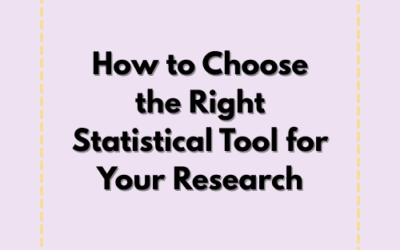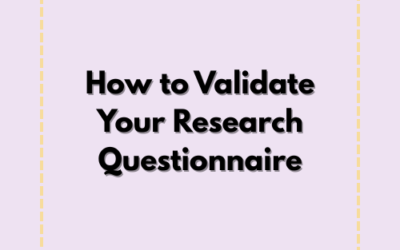Selecting the appropriate research methodology is a critical step in any academic or scientific study. The right methodology not only shapes how you collect and analyze data but also determines the validity and reliability of your findings.
This guide will walk you through the process of choosing the most suitable methodology for your research project.
TABLE OF CONTENTS
Understanding the Purpose of Your Research
Before diving into methodologies, it’s crucial to have a clear understanding of your research objectives. Start by defining your research question and considering the nature of your study:
- Is it exploratory, aiming to investigate a new area?
- Is it descriptive, seeking to provide a detailed account of a phenomenon?
- Is it explanatory, attempting to establish cause-and-effect relationships?
Your research purpose will significantly influence the methodology you choose.
Key Factors in Choosing a Methodology
Several factors should guide your selection process:
- Research topic and field: Different disciplines often have preferred methodological approaches.
- Available resources: Consider your budget, time constraints, and access to necessary tools or participants.
- Target audience: Think about who will be reading your research and what methodologies they expect or value.
- Ethical considerations: Ensure your chosen methodology adheres to ethical standards in your field.
- Time frame: Some methodologies require more time than others for data collection and analysis.
Common Research Methodologies
When conducting research, there are three main methodological approaches to choose from: quantitative, qualitative, and mixed-methods.
Each methodology has its own strengths and is suited for different types of research questions and goals. Understanding the key characteristics and data gathering processes of each approach can help researchers select the most appropriate methodology for their study [1] [2] [3].
Quantitative Research
Quantitative research focuses on collecting and analyzing numerical data to test hypotheses and draw conclusions [4]. This methodology uses structured data collection methods to gather large amounts of data that can be statistically analyzed. Quantitative research aims to be objective and generalizable, often seeking to identify relationships between variables or compare groups [5].
Types of data gathering processes for quantitative research:
- Surveys and questionnaires with closed-ended questions [6]
- Structured observations and experiments [6]
- Secondary data analysis of existing numerical datasets [7]
- Standardized tests and measurements [7]
- Physiological measurements (e.g. heart rate, blood pressure) [8]
Qualitative Research
Qualitative research explores and seeks to understand people’s experiences, perspectives, and meanings in depth [9] [10]. This methodology uses open-ended data collection methods to gather rich, descriptive data. Qualitative research is interpretive and context-specific, aiming to develop theories or provide detailed descriptions of phenomena [11] [20].
Types of data gathering processes for quantitative research:
- In-depth interviews (individual or group) [12]
- Focus groups [12]
- Participant observation [12]
- Document analysis [12]
- Open-ended surveys and questionnaires [12]
Mixed-Methods Research
Mixed-methods research combines both quantitative and qualitative approaches within a single study [13] [14]. This methodology integrates different types of data and analyses to provide a more comprehensive understanding of the research problem. Mixed-methods research leverages the strengths of both quantitative and qualitative approaches while offsetting their weaknesses [15] [19].
Types of data gathering processes for quantitative research:
- Sequential data collection (e.g. surveys followed by interviews) [16]
- Concurrent data collection (e.g. surveys with open and closed questions) [16]
- Embedded design (e.g. qualitative data collection within an experiment) [17]
- Transformative design (e.g. participatory action research with surveys) [17]
- Multiphase design (e.g. longitudinal studies with alternating quant/qual phases) [18]
Each methodology offers unique insights, and the choice depends on the nature of the research problem and the type of data needed to answer it comprehensively.
Evaluating Methodologies
When assessing different methodologies, consider:
- Strengths and limitations of each approach
- Suitability for your specific research question
- Data collection and analysis requirements
- Validity and reliability considerations
Steps to Select the Right Methodology
- Define your research question and objectives
Clearly articulate what you aim to investigate or achieve with your study. The nature of your research question will help guide your choice of methodology [21]. - Review existing literature and methodologies
Examine how other researchers have approached similar topics or questions. This can provide insights into effective methodological approaches for your area of study [22] - Consider your data needs and availability
Determine what type of data you need to answer your research question. Assess whether you require quantitative, qualitative, or a mix of both. Also, consider what data sources are available and accessible to you [23] - Evaluate your resources and constraints
Consider practical factors like time, budget, access to participants or data, and your research skills and expertise. Choose a methodology that is feasible given your resources [24] - Match methodology to research goals
Select a methodology that aligns with your research objectives and philosophical approach. Consider whether you need an exploratory, descriptive, or explanatory approach [25]. Determine if qualitative, quantitative, or mixed methods would be most appropriate for addressing your research question.
The key is ensuring alignment between your research goals, available resources, and chosen methodological approach.
Adapting and Combining Methodologies
In today’s complex research landscape, rigidly adhering to a single methodology often fails to capture the full picture. Instead, many researchers are finding success by adapting and combining different methodological approaches [26] [27]. This flexible strategy allows studies to leverage the strengths of multiple methods while mitigating their individual weaknesses [31] [32].
Some key benefits of adapting and combining methodologies include:
- Gaining a more comprehensive understanding of the research topic [28]
- Improving the credibility and validity of findings through triangulation [28]
- Allowing for unexpected insights to emerge during the research process [28]
- Tailoring the approach to best fit the specific research questions and contents [28]
Common ways to combine methods include:
- Using qualitative interviews to inform the design of a quantitative survey [29]
- Conducting follow-up qualitative research to explain quantitative results [29]
- Employing mixed methods designs that integrate qualitative and quantitative data [29]
- Adapting established methodologies to fit new research contexts or populations [29]
When adapting methodologies, researchers should:
- Justify methodological choices and how they align with research goals [30]
- Remain open to adjusting the approach as new information emerges [30]
- Carefully consider how different methods and data types will be integrated [30]
- Be transparent about any limitations of the adapted approach [30]
This flexible mindset allows researchers to tailor their approach to the unique needs of each project.
Common Pitfalls to Avoid
Be wary of:
- Choosing a methodology based solely on personal preference
- Overlooking potential biases in your approach
- Ignoring the ethical implications of your chosen method
- Failing to consider data analysis requirements
Selecting the right methodology is a crucial step in ensuring the success and credibility of your research. Carefully considering your research objectives, evaluating various methodological approaches, and aligning your choice with practical considerations, you can create a solid foundation for your study.
There’s no one-size-fits-all approach to research. The best methodology is the one that most effectively answers your research question while adhering to the standards of your field. Be prepared to justify your methodological choices and remain flexible as your research evolves.
Are you seeking professional writing assistance? The Writeler Co. is here to help! Our team of experienced writers and editors can provide personalized strategies to overcome writer’s block and elevate your writing. Whether you need help brainstorming ideas, structuring your work, or polishing your final draft, we’ve got you covered. Visit our website or contact us today to learn how we can support your writing journey and help you unleash your creative potential.
References:
[1] https://www.scribbr.com/methodology/quantitative-research/
[2] https://researcher.life/blog/article/what-is-quantitative-research-types-and-examples/
[3] https://libguides.usc.edu/writingguide/quantitative
[4] https://www.ncbi.nlm.nih.gov/books/NBK470395/
[5] https://www.voxco.com/blog/qualitative-research-methodology-definition-types-and-examples/
[6] https://jcu.pressbooks.pub/intro-res-methods-health/chapter/4-2-definitions-and-characteristics-of-qualitative-research/
[7] https://en.wikipedia.org/wiki/Multimethodology
[8] https://www.scribbr.com/methodology/mixed-methods-research/
[9] https://www.lawctopus.com/academike/mixed-methods-research/
[10] https://www.questionpro.com/blog/quantitative-data-collection-methods/
[11] https://research-methodology.net/research-methods/quantitative-research/
[12] https://libguides.uta.edu/quantitative_and_qualitative_research/quant
[13] https://www.questionpro.com/blog/quantitative-research/
[14] https://www.scribbr.com/methodology/qualitative-research/
[15] https://www.theforage.com/blog/skills/what-is-qualitative-research
[16] https://catalyst.harvard.edu/community-engagement/mmr/
[17] https://dovetail.com/research/mixed-methods-research/
[18] https://www.quantilope.com/resources/glossary-data-collection-methods-quantitative-research
[19] https://www.gcu.edu/blog/doctoral-journey/most-effective-quantitative-data-collection-methods
[20] https://jcu.pressbooks.pub/intro-res-methods-health/chapter/3-3-methods-of-quantitative-data-collection/
[21] https://www.monash.edu/library/help/assignments-research/developing-research-questions
[22] https://www.enago.com/academy/how-to-develop-good-research-question-types-examples/
[23] https://www.scribbr.com/research-process/research-question-examples/
[24] https://www.indeed.com/career-advice/career-development/research-objectives
[25] http://kwangaikamed.weebly.com/evaluating-and-reporting-of-research.html
[26] https://www.tandfonline.com/doi/full/10.1080/13645579.2021.1964858
[27] https://www.scribbr.com/methodology/mixed-methods-research/
[28] https://dovetail.com/research/mixed-methods-research/
[29] https://www.uts.edu.au/sites/default/files/2021-01/Adapting_research_methd_2ndEdn_06_Jan_FIN.pdf
[30] https://delvetool.com/blog/mixedmethods
[31] https://www.tandfonline.com/doi/full/10.1080/00330124.2021.2023593
[32] https://www.emerald.com/insight/content/doi/10.1108/JOSM-05-2020-0153/full/html





0 Comments